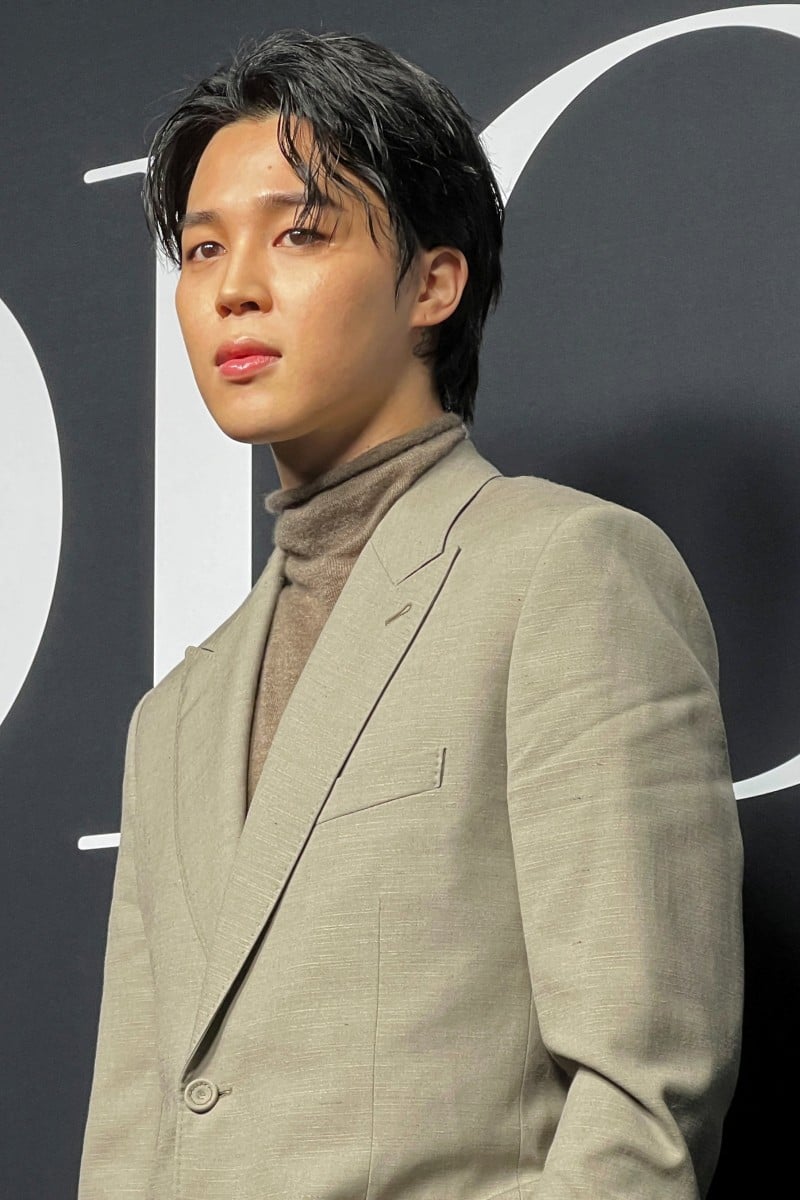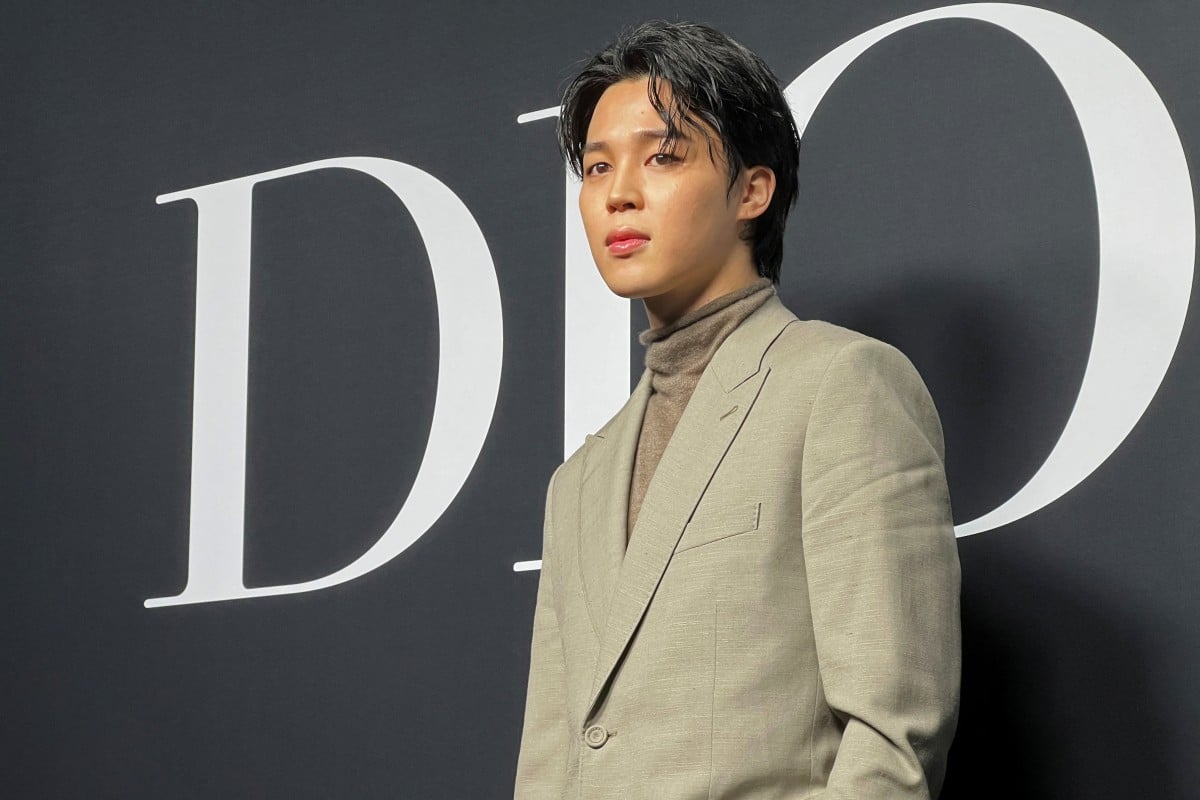
Study Buddy (Challenger): What’s the Jimin effect? Teens feel pressure to buy luxury fashion endorsed by K-pop stars
- BTS member, now a global brand ambassador for Dior, has joined the list of Korean idols appointed by high-end brands to help reel in young customers
- This page is for students who want to take their understanding to the next level with difficult vocabulary and questions to test their inference skills
 Jimin is Dior’s global brand ambassador. Across the fashion industry, companies are recognising the star power of K-pop idols. Photo: Reuters
Jimin is Dior’s global brand ambassador. Across the fashion industry, companies are recognising the star power of K-pop idols. Photo: ReutersContent provided by British Council
Read the following text, and answer questions 1-9 below:
[1] A mother recently bought her daughter a Vivienne Westwood cross bag for 580,000 Korean won (HK$3,688). “My 16-year-old daughter actually asked for a Prada or Saint Laurent handbag, which are at least five times more expensive. But I told her no because it’s too pricey for a high school student,” she said. “Now, I’m worried that she might want a more expensive item next.”
[2] The thousands of luxury haul videos of precocious teenagers boasting of shopping sprees indicate that luxury shoppers are getting younger. In a 2020 survey of 783 middle and high school students conducted by Smart F&D, 56.4 per cent of respondents said they had bought luxury products.
[3] Experts say that the appeal of luxury brands for teenage consumers is in the bandwagon effect of social media. “Consumers generally choose luxury goods that meet their unique tastes and preferences. But Koreans tend to make a safe choice by purchasing the most popular ones. To make better decisions, they often rely on celebrities who are associated with luxury brands,” said Kwak Geum-ju, a psychology professor at Seoul National University.
[4] Suh Yong-gu, a business professor at Sookmyung Women’s University, characterised teenage consumers as being in one-way relationships with K-pop stars. “K-pop stars are top influencers. Because luxury sales are digitally influenced, their social media posts and YouTube videos on luxury brands lead to ‘flex culture’ – flaunting of wealth – among younger consumers,” the professor explained.
[5] Chasing Asia’s big spenders, some luxury brands have recently appointed K-pop stars as their global ambassadors. In January, French fashion house Dior named Jimin of K-pop boy band BTS as a global brand ambassador. Suga of BTS is now the global ambassador of Italian luxury fashion brand Valentino, and BigBang vocalist Taeyang is one of Givenchy’s ambassadors.
[6] Luxury brands are well aware of the enormous influence that K-pop artists have on attracting young shoppers and creating social media hype. Sales are almost guaranteed to increase significantly if brands find the right face to represent their products.
[7] “After Covid-19, Europe’s luxury market has been shrinking, while the Asian market kept growing. Pivoting to Asia, brands are appointing Korean celebrities as ambassadors because of their huge influence in the region,” Suh said. “The more young consumers learn about luxury brands through K-pop idols, the more they wish to buy. There is even a personality test called ‘What luxury brand are you?’”
[8] Lim Myung-ho, a psychology professor at Dankook University, warned teenage consumers to refrain from overspending on luxury goods. “What surprised me lately is that kids liken the hierarchy of K-pop idols to the hierarchy of luxury brands by comparing who is the ambassador of what brand. In many cases, teenage consumers feel like celebrities are an extension of themselves,” he said.
[9] “They largely depend on their parents’ money and end up spending above their budget. Usually, people have a stronger desire to splurge when they have less control over their lives – for students, it’s common when they feel discouraged about studying and improving their academic records. In the long term, these behaviours may lead to bad consumption habits.”
Source: The Korea Times, February 4
Questions
1. What did the parent mentioned in paragraph 1 think about her daughter’s initial request?
2. What does the word “precocious” suggest about the teenagers mentioned in paragraph 2?
3. In paragraph 2, the survey found that ...
A. more parents were willing to buy high-end goods for their children.
B. high school students were more inclined to spend their money on branded products.
C. more than half of the respondents had at least one luxury item.
D. the number of teenagers with goods from luxury brands increased tenfold in the last decade.
4. Which of the following is likely NOT featured in a “luxury haul video”?
A. unboxing of branded products
B. comparison of different luxury items
C. online showcase of various high-end goods
D. none of the above
5. How are Korean consumers different to those from other places according to paragraph 3?
6. Find a phrase in paragraph 4 that refers to “a phenomenon in which people do or support something primarily because others are doing it”.
7. Why were the individuals mentioned in paragraph 5 appointed as luxury brand ambassadors? (2 marks)
8. What might be the purpose of the personality test mentioned in paragraph 7?
9. Decide whether the following statements are True, False, or if the information is Not Given in the text. Blacken ONE circle only for each statement. (4 marks)
(i) “Flex culture” refers to a type of consumption related to showing off how much money one has.
(ii) Valentino quadrupled its profits after appointing Suga as its global ambassador.
(iii) Teens are mostly resistant to advertisements featuring celebrities promoting goods on social media.
(iv) Teenagers who are struggling with their academics are more likely to be obsessed with luxury items.
Answers
1. She thought the handbag her daughter wanted was too pricey for a high school student.
2. They are too young to take part in luxury shopping sprees. (accept other similar answers)
3. C
4. D
5. Instead of choosing luxury goods that meet their unique tastes and preferences, they tend to make a safe choice by purchasing the most popular ones endorsed by celebrities.
6. bandwagon effect
7. They can drive up sales of the respective brands they represent because of their popularity with young shoppers in Asia. (accept similar answers)
8. to introduce young shoppers to different luxury brands (accept other reasonable answers)
9. (i) T; (ii) NG; (iii) F; (iv) T
